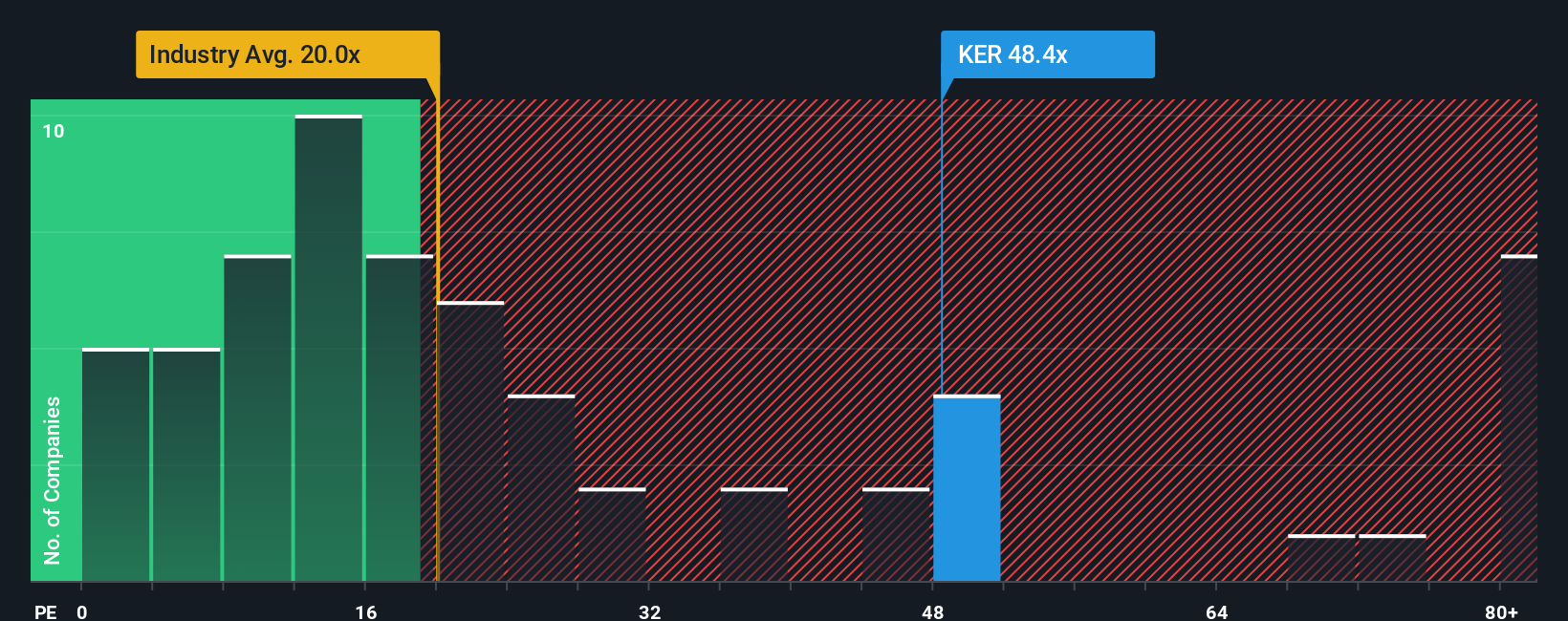Why Investors Shouldn't Be Surprised By Kering SA's (EPA:KER) 26% Share Price Surge
Despite an already strong run, Kering SA (EPA:KER) shares have been powering on, with a gain of 26% in the last thirty days. Looking further back, the 12% rise over the last twelve months isn't too bad notwithstanding the strength over the last 30 days.
Following the firm bounce in price, Kering may be sending very bearish signals at the moment with a price-to-earnings (or "P/E") ratio of 48.4x, since almost half of all companies in France have P/E ratios under 16x and even P/E's lower than 10x are not unusual. However, the P/E might be quite high for a reason and it requires further investigation to determine if it's justified.
Kering has been struggling lately as its earnings have declined faster than most other companies. It might be that many expect the dismal earnings performance to recover substantially, which has kept the P/E from collapsing. If not, then existing shareholders may be very nervous about the viability of the share price.
View our latest analysis for Kering

Does Growth Match The High P/E?
The only time you'd be truly comfortable seeing a P/E as steep as Kering's is when the company's growth is on track to outshine the market decidedly.
Retrospectively, the last year delivered a frustrating 65% decrease to the company's bottom line. The last three years don't look nice either as the company has shrunk EPS by 80% in aggregate. Therefore, it's fair to say the earnings growth recently has been undesirable for the company.
Looking ahead now, EPS is anticipated to climb by 29% per year during the coming three years according to the analysts following the company. Meanwhile, the rest of the market is forecast to only expand by 12% per year, which is noticeably less attractive.
With this information, we can see why Kering is trading at such a high P/E compared to the market. Apparently shareholders aren't keen to offload something that is potentially eyeing a more prosperous future.
What We Can Learn From Kering's P/E?
The strong share price surge has got Kering's P/E rushing to great heights as well. We'd say the price-to-earnings ratio's power isn't primarily as a valuation instrument but rather to gauge current investor sentiment and future expectations.
We've established that Kering maintains its high P/E on the strength of its forecast growth being higher than the wider market, as expected. Right now shareholders are comfortable with the P/E as they are quite confident future earnings aren't under threat. It's hard to see the share price falling strongly in the near future under these circumstances.
It is also worth noting that we have found 3 warning signs for Kering that you need to take into consideration.
You might be able to find a better investment than Kering. If you want a selection of possible candidates, check out this free list of interesting companies that trade on a low P/E (but have proven they can grow earnings).
Valuation is complex, but we're here to simplify it.
Discover if Kering might be undervalued or overvalued with our detailed analysis, featuring fair value estimates, potential risks, dividends, insider trades, and its financial condition.
Access Free AnalysisHave feedback on this article? Concerned about the content? Get in touch with us directly. Alternatively, email editorial-team (at) simplywallst.com.
This article by Simply Wall St is general in nature. We provide commentary based on historical data and analyst forecasts only using an unbiased methodology and our articles are not intended to be financial advice. It does not constitute a recommendation to buy or sell any stock, and does not take account of your objectives, or your financial situation. We aim to bring you long-term focused analysis driven by fundamental data. Note that our analysis may not factor in the latest price-sensitive company announcements or qualitative material. Simply Wall St has no position in any stocks mentioned.
About ENXTPA:KER
Kering
Manages the development of a collection of renowned houses in fashion, leather goods, and jewelry in the Asia Pacific, Western Europe, North America, Japan, and internationally.
Moderate growth potential with mediocre balance sheet.
Market Insights
Community Narratives




